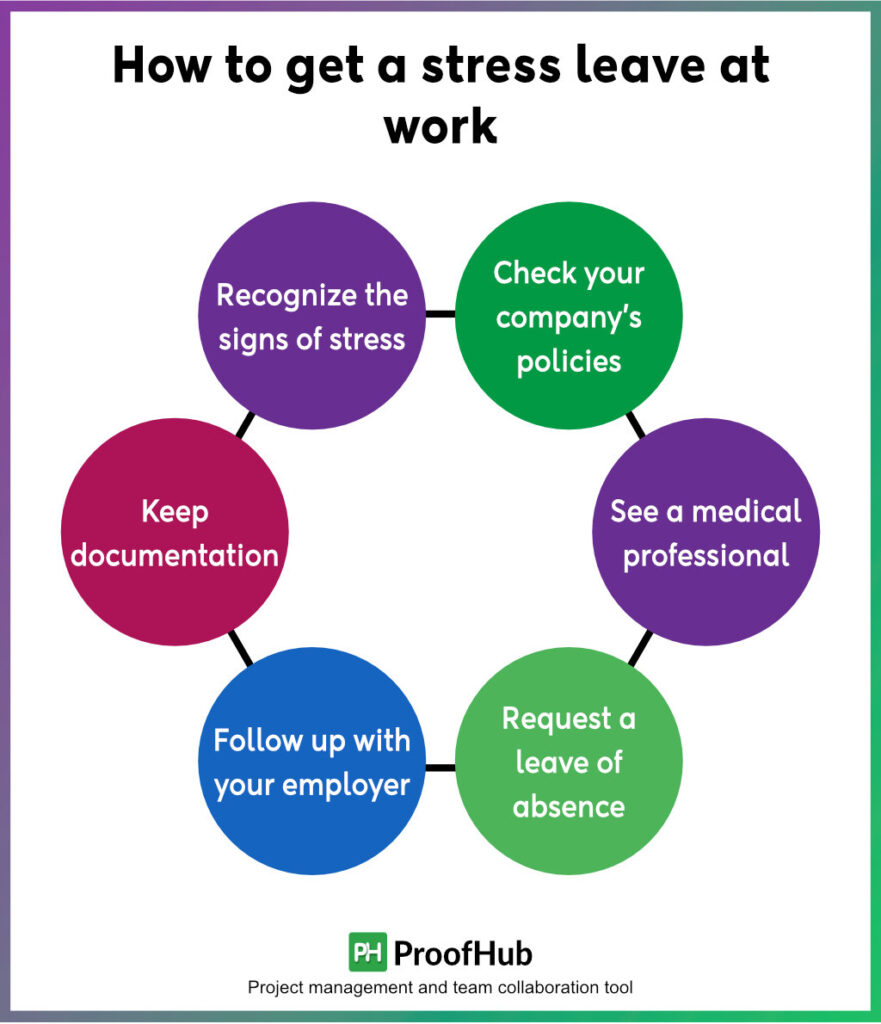Stress Leave at Work: Feeling overwhelmed at work? You’re not alone.
Stress can creep in quietly, but before you know it, it starts affecting your health, focus, and overall happiness. If you’re at a breaking point, taking stress leave might be exactly what you need to reset and recharge. But how do you even start that conversation with your employer?
What steps do you need to follow? In this guide, you’ll learn everything you need to know about going on stress leave—from recognizing the signs it’s time to step back, to navigating workplace policies with confidence. By the end of this article, you’ll feel empowered to take action and prioritize your well-being without guilt or hesitation. Ready to take control of your mental health? Let’s dive in.

Understanding Stress Leave at Work
Stress is more than just feeling overwhelmed after a busy week. It can deeply affect your mental and physical health. Understanding stress leave is the first step to taking control of your well-being and seeking the help you need.
What Is Stress Leave?
Stress leave is time away from work to recover from severe stress that affects your ability to perform your job. It’s not about taking a casual day off; it’s a necessary break to focus on your health. This type of leave is often protected by workplace policies or labor laws in many countries.
Why Is Stress Leave Important?
Ignoring stress can lead to burnout, anxiety, or even physical illnesses. Taking stress leave helps you address these issues before they spiral out of control. It’s about prioritizing your health so you can return to work with renewed focus and energy.
How Do You Know You Need Stress Leave?
Pay attention to signs like constant fatigue, trouble sleeping, or feeling emotionally drained. If you find yourself dreading work or struggling to complete tasks you once enjoyed, it may be time to consider stress leave. A conversation with a mental health professional can also help you understand if this step is necessary.
Can You Take Stress Leave Without Guilt?
Yes, and you should. You wouldn’t hesitate to treat a broken arm, so why hesitate to care for your mental health? Remember, taking care of yourself isn’t a weakness; it’s a responsibility.
Do You Need Documentation?
In most workplaces, you’ll need a doctor’s note or a medical certificate to qualify for stress leave. Schedule an appointment with your doctor and explain how stress is impacting your daily life. They can provide the necessary documentation to support your request.
What Happens During Stress Leave?
Stress leave is your time to focus entirely on recovery. This might involve therapy sessions, practicing mindfulness, or simply resting. Use this period to identify the root causes of your stress and develop strategies to manage them effectively.
Taking stress leave might feel daunting, but it could be the best decision for your health. Are you ready to take that step for yourself?

Credit: www.proofhub.com
Signs You May Need Stress Leave
Stress can sneak into your life in small, unnoticed ways. One day, you’re handling your workload fine, and the next, you feel overwhelmed just thinking about your email inbox. Recognizing the signs that you may need stress leave is crucial for protecting your mental health and ensuring long-term well-being.
Signs Your Work Stress Is Affecting Your Health
Stress doesn’t just live in your head; it can show up in your body too. Are you experiencing frequent headaches, stomach issues, or insomnia? These physical symptoms might be your body’s way of telling you it’s time to take a break.
Pay attention to changes in your energy. If you’re feeling tired all the time—even after a full night’s sleep—it could be a red flag. Chronic fatigue and exhaustion often go hand in hand with workplace stress.
Difficulty Concentrating Or Making Decisions
Has your productivity taken a hit lately? If you’re struggling to focus on tasks or forgetting things more often, stress could be clouding your mind. This mental fog can make even simple decisions feel impossible.
Try to notice if small mistakes are becoming more frequent. It’s not about perfection—it’s about recognizing when stress is impacting your ability to do your job well.
Loss Of Interest In Your Work
Do you feel like your passion for your job has disappeared? Losing interest in work you once enjoyed is a common sign of burnout. When stress becomes overwhelming, motivation often takes a back seat.
Ask yourself: Are you just going through the motions every day? If the answer is yes, it might be time to consider stress leave.
Changes In Your Mood And Behavior
Stress can cause mood swings, irritability, or even feelings of sadness and hopelessness. Have you noticed yourself snapping at coworkers or avoiding social interactions? This shift in behavior could signal deeper issues.
If you feel disconnected from your usual self, don’t ignore it. Stress affects your emotional health as much as it does your physical health.
How To Tell If Stress Is Affecting Your Relationships
Work stress doesn’t stay at work—it spills into your personal life too. Are your friends or family mentioning that you seem distant or overly stressed? If your relationships are suffering, it’s time to reevaluate your situation.
Think about how often you say, “I’m too busy” or “I’m too tired” to spend time with loved ones. If work stress is keeping you from meaningful connections, it’s worth considering stress leave.
Recognizing these signs is the first step toward regaining control of your life. Stress leave isn’t a failure—it’s a smart move for your health and happiness. Take these signals seriously and act before the stress worsens.
Know Your Workplace Policies
Understanding your workplace policies is a crucial step when preparing to go on stress leave. It might feel overwhelming at first, but knowing the rules empowers you to make informed decisions. Most companies have clear guidelines in place—your job is to find them and make them work for you.
How To Locate Your Workplace Policies
Start by checking your employee handbook or HR portal. Many organizations outline their leave policies in these resources. If you’re unsure where to look, ask your HR department directly—they’re there to guide you.
If your workplace doesn’t have a formal policy, don’t panic. Ask your supervisor or HR for clarity on how stress leave is handled. Sometimes, small companies operate on case-by-case arrangements.
Understand What Your Policy Covers
Does your employer offer paid leave, unpaid leave, or a combination of both? Find out how long you’re eligible to take off and whether you need a doctor’s note. These details are essential for planning your next steps.
For instance, some workplaces may require you to exhaust personal or vacation days before starting medical leave. Others might provide immediate access to stress leave if your situation qualifies. Knowing these nuances can save you unnecessary stress during an already difficult time.
Ask The Right Questions
Don’t shy away from asking questions. Can you work part-time while on leave? Is your job guaranteed when you return? Will your benefits remain active?
Write down a list of questions before speaking with HR or your manager. The more you know, the less you’ll worry about unknowns. Remember, you have the right to get clear answers about your leave options.
Document Everything
Keep a record of all your communications. Save emails, take notes during meetings, and ask for written confirmation of any agreements. This ensures everyone is on the same page and protects you if misunderstandings arise.
For example, if HR confirms your eligibility for leave via email, save that message. In case of disputes, having a paper trail can make all the difference.
Why Knowing Policies Matters
Skipping this step can lead to unnecessary stress and delays. Imagine requesting leave only to find out you didn’t follow the proper procedure. Avoid that by being proactive and informed.
Taking stress leave is a big step, but it’s one you don’t have to take blindly. Start with your workplace policies, and you’ll feel more confident about advocating for yourself. So, are you ready to take control of your well-being?

Credit: mentalhealthhope.com
Gather Required Documentation
Taking stress leave from work can feel overwhelming, but preparing the right documentation makes the process smoother. Having the correct paperwork ensures your employer understands your situation and supports your recovery. It also protects your rights and helps you navigate the process confidently.
Consulting A Healthcare Professional
Your first step is to consult a healthcare professional who can assess your situation. This could be your family doctor, a therapist, or a psychologist. Be honest about your symptoms and how they impact your ability to work.
Don’t downplay your struggles—this is your time to share openly. They need a clear picture of your stress levels to recommend the appropriate course of action. If you’ve noticed physical symptoms like headaches or insomnia, mention those too, as stress can affect your entire body.
Obtaining A Medical Certificate
A medical certificate is often required to apply for stress leave. After your consultation, ask your healthcare provider for this document. It should confirm that your condition affects your ability to work and recommend time off for recovery.
Make sure the certificate includes details like the duration of leave needed. Employers generally don’t need to know every detail of your condition, so your provider can keep the explanation brief while still meeting legal requirements. Double-check that the certificate is signed and dated before submitting it to your employer.
Have you ever delayed seeking help because you weren’t sure how to start? Taking these steps now can save you from prolonging stress and help you get the support you deserve. What’s stopping you from reaching out for that first consultation today?
Informing Your Employer
Stress leave is a serious decision that requires open communication. Informing your employer is an important step to ensure proper support. Sharing your concerns honestly can help create a positive outcome. Keep the conversation professional and focused on your needs.
How To Start The Conversation
Choose a private setting to speak with your manager or HR. Schedule a meeting to avoid interruptions. Start by stating your need to discuss a personal matter. Keep your tone respectful and calm throughout the conversation.
Explain that work stress is affecting your health and performance. Emphasize that you need time to recover and regain balance. Show a willingness to cooperate and keep communication open.
What Information To Share
Provide enough details about your situation to help your employer understand. Avoid sharing overly personal or unrelated information. Focus on the work-related impact of your stress and your need for leave.
If you have a doctor’s recommendation, mention it briefly. Be clear about the length of leave you require and any adjustments needed. Share how you plan to return to work once you recover.
Filing The Necessary Paperwork
Filing the necessary paperwork for stress leave might feel overwhelming, but it doesn’t have to be. By following a clear process and knowing what’s required, you can ensure everything is completed correctly. This step is crucial to protect your rights and make your leave official.
Understanding Your Company’s Policies
Start by reviewing your company’s employee handbook or intranet. Every workplace has its own rules about stress leave, and knowing them upfront will save you time. If you’re unsure where to find this information, ask HR or your manager directly.
Check if your workplace requires specific forms or documents. Some companies might need a doctor’s note, while others may have their own internal forms. Knowing exactly what’s expected will help you avoid delays.
Getting A Medical Certificate
Most employers will ask for proof that you need stress leave, and this often means a medical certificate. Schedule an appointment with your doctor or a mental health professional to explain your situation. Be honest about your symptoms and how they’re affecting your ability to work.
Your doctor can recommend the duration of your leave based on your condition. Ensure the certificate includes clear dates and a statement about why you need time off. This document is key to ensuring your leave is approved.
Filling Out Employer Forms
Many workplaces require you to fill out specific forms to apply for stress leave. These forms might ask for details about your condition, the expected duration of your leave, and your doctor’s contact information. Take your time to complete these forms accurately.
If you’re unsure about any section, don’t guess—reach out to HR for clarification. Mistakes could cause delays in processing your request. Double-check everything before submitting to avoid unnecessary back-and-forth.
Submitting Your Paperwork
Once everything is ready, submit your paperwork to the appropriate department, usually HR. Ask if there’s a preferred method—email, in person, or through an internal system. Keep a copy of everything you submit for your own records.
Don’t hesitate to follow up if you don’t hear back within a reasonable timeframe. Politely ask for confirmation that your documents were received and check if any additional steps are required. Being proactive ensures the process moves smoothly.
What Happens Next?
After filing, your employer will review your request and let you know if it’s approved. Depending on the company, this might take a few days or weeks. Use this time to focus on your well-being and plan how you’ll spend your leave to recover effectively.
Have you ever hesitated to take stress leave because of the paperwork? It’s worth asking yourself if the short-term effort is worth the long-term benefit of protecting your health. When you take the time to file everything correctly, you’re not just following a process—you’re prioritizing yourself.
Exploring Leave Options
Taking stress leave at work can feel overwhelming. Understanding leave options can make the process easier. Employers often offer different types of leaves that vary in benefits. Knowing what’s available helps you choose the best option for your situation.
Paid Vs. Unpaid Leave
Paid leave allows you to take time off while still earning your salary. Employers may offer this as sick leave, vacation time, or personal days. Check your company’s policies to see how much paid leave you qualify for.
Unpaid leave is another option. While you won’t get paid, it gives you time to recover without losing your job. This type of leave is often protected under laws like the Family and Medical Leave Act (FMLA). Speak with your HR department to learn more.
Short-term Disability Benefits
Short-term disability benefits may cover part of your income during stress leave. These benefits usually apply to medical issues affecting your ability to work. Stress-related conditions, like anxiety or burnout, can qualify if diagnosed by a doctor.
To access these benefits, you may need medical documentation. Your employer or insurance provider can guide you through the application process. Review your policy carefully to understand the coverage limits and waiting periods.
Protecting Your Job During Leave
Stress leave can be a challenging time, but it’s crucial to protect your job while prioritizing your mental health. Many people worry about losing their position or facing workplace concerns when they take leave. By understanding your rights and handling the situation thoughtfully, you can safeguard your career while giving yourself the space to recover.
Understanding Your Legal Rights
You have legal protections that ensure your job is secure during stress leave. In many countries, laws like the Family and Medical Leave Act (FMLA) in the U.S. allow eligible employees to take unpaid leave for health-related reasons without risking their job.
It’s essential to familiarize yourself with your specific rights. Check your company’s leave policies and consult local labor laws. If you’re unsure, reach out to HR or a legal expert to confirm your protections.
Did you know some organizations offer paid stress leave? Review your employee handbook or benefits package—you might discover perks you didn’t know existed.
Handling Workplace Concerns
Workplace concerns often arise when you decide to take leave. Your boss might worry about deadlines, or your team might wonder how they’ll manage without you. Clear communication is key to addressing these issues.
Speak openly with your manager. Explain why you need leave and how it benefits both you and the company in the long term. Share your plan for transitioning responsibilities, such as delegating tasks or creating a detailed handover document.
Have you thought about how to maintain a positive relationship with your team? A quick message expressing gratitude for their support can go a long way. This small effort helps avoid unnecessary tension and keeps the door open for a smooth return.
Preparing For Your Return To Work
Taking stress leave requires clear communication with your employer and understanding workplace policies. Speak with a doctor to document your health concerns. Submit necessary paperwork to your HR department to ensure proper support during your leave.
Taking stress leave is a step toward better mental health. Returning to work after this time can feel overwhelming. With the right preparation, you can ease back into your routine. Planning ahead helps create a smoother transition. It also ensures you maintain your well-being after returning.
Creating A Return Plan
A return plan can help you regain confidence at work. Start by discussing your return with your manager or HR. Share your needs and work together to create a flexible schedule. Ease back into work with reduced hours or responsibilities if needed. This gradual approach prevents you from feeling overwhelmed.
Set clear boundaries to protect your mental health. Decide on work hours and stick to them. Avoid taking on too many tasks during the initial weeks. This ensures you stay focused and stress-free.
Building A Supportive Environment
A supportive workplace makes returning easier. Talk to your coworkers about your needs, if comfortable. Their understanding can create a positive atmosphere. Seek help from HR or your manager to address workplace stressors.
Make use of workplace resources like counseling services, if available. Join employee support groups to connect with others who understand your journey. Surround yourself with colleagues who encourage and uplift you. This support system can be vital as you adjust to work again.
“`

Frequently Asked Questions
What Do You Say To Your Doctor To Get Stress Leave?
Explain your symptoms clearly, such as fatigue, anxiety, or inability to focus. Request stress leave directly if needed.
How Do I Get Off Work On Stress Leave?
To get stress leave, consult your doctor for a medical evaluation. Obtain a note recommending leave. Inform your employer promptly. Check your workplace policies and submit required documentation. Ensure compliance with applicable laws and guidelines.
How Can I Get A Stress Leave From Work?
To get stress leave, consult your doctor for evaluation and documentation. Submit the medical certificate to your employer. Check your company’s leave policy and communicate clearly with HR. Follow legal guidelines and ensure proper documentation for approval. Prioritize self-care during your leave.
Can I Lose My Job Due To Mental Illness?
Losing a job due to mental illness depends on workplace policies and performance impact. Laws protect against unfair discrimination.
Read more our previous post for: Hair loss is Genetic Or Stress / Stress Leave / Does Homework Cause Stress / Hema Contact Lens / Dr Contact Lens Promo Code / Marlo Contact Lens / trust issues / Mini Tummy Tuck / Newborn Baby Weight / 16-Week Ultrasound / Diabetes Care for Early stage / Metformin for Diabetes / Mattress for Arthritis / Affordable Healthcare / U.S. Healthcare / Sleep Deprived / Endometriosis Surgery Recovery Time
you can check: Fertility Calculator / BMI Calculator / BMR Calculator / Health Risks Calculator / Mental Health Hospital Quotes on Mental Health / Vanicream Vitamin C / Plastic Surgery Center / Vitamin D3 for Sexually
Read More: Ashwagandha Can Make You Horny / Vaginal Pump / Omron Blood Pressure / Vitamin C in Daily / vitamin D deficiency / magic wash laundromat / amphound / pixelxoom / cake ideas
Read More: vaginal depth / Vaginal Pump / Vaginal Cuff / Vaginal Dryness / Tighten Your Vagina / Sore Penis After Sex / Nicotine and Your Sex Drive / Why am I so horny? / Sexual Battery
Read more: 8 oz Chicken Breast / Sea Moss Gel / V8 Energy Drinks / 3 eggs calories / Eating Masago
Conclusion
Taking stress leave is essential for your health and well-being. Prioritize yourself and communicate clearly with your employer. Follow the steps required to ensure a smooth process. Seek professional advice if you’re unsure about your rights. Addressing stress early can prevent bigger challenges later.
Remember, taking time to recover benefits both you and your workplace. Don’t ignore the signs of burnout or exhaustion. Your mental health matters just as much as your physical health. Start the conversation today and take the steps needed to heal.



